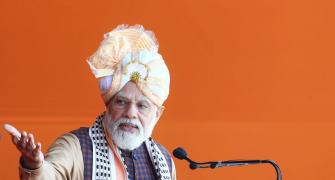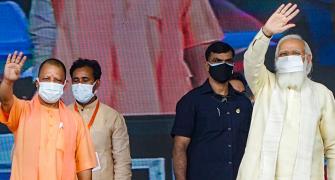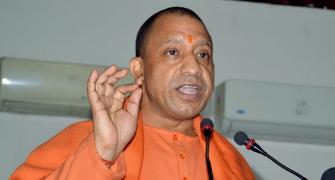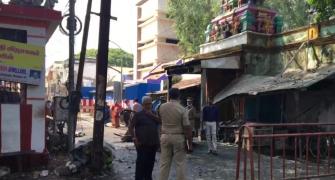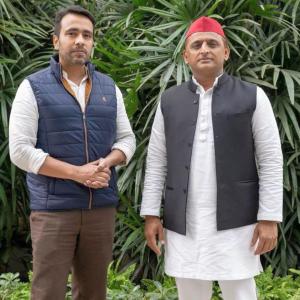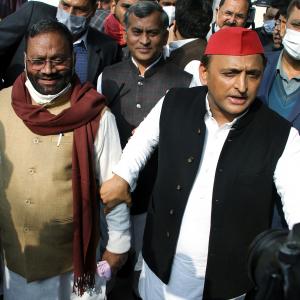Keshav Prasad Maurya's election from Sirathu in Kaushambi will be among the keenly watched contests in UP.
If he and the BJP win, will he be luckier this time?

The political life and times of Keshav Prasad Maurya, Uttar Pradesh's deputy chief minister, reinforce the congenital contradictions in the Bharatiya Janata Party's endeavour to marry 'Mandal' and 'Kamandal' in a unified whole.
It is not easy to reconcile a pan-Hindu identity, derived from the Rashtriya Swayamsevak Sangh's Hindutva concepts, with the aspirations and ambitions of the less empowered castes which saw statutory reservations in educational institutions and government jobs as the greatest facilitator of their upward mobility, although this pitted them in direct conflict with the upper castes.
The Hindutva-caste antagonisms dogged the BJP in 1991 when the Mandal upsurge among the Other Backward Classes or backward castes in Bihar and Uttar Pradesh's Poorvanchal forced its leaders to revisit their plans of appointing Murli Manohar Joshi or Kalraj Mishra, both Brahmins, as the first chief minister of a full-fledged BJP government in Lucknow.
The BJP brass opted for Kalyan Singh, who was from the BC Lodh-Rajput sub-caste. Singh never had it easy in his truncated first tenure or the subsequent stints as CM, primarily because he was undecided on which political persona he should adopt -- that of a Hindu hriday samrat (monarch of the Hindu heart) or a backward caste neta.
Years later, Narendra Modi, a BC Teli, was possibly up against the same challenge when he was first appointed Gujarat CM and later elected as prime minister. Unlike Singh, he calibrated both facets, depending on circumstances and political compulsions.
Keshav Prasad Maurya, 53, did not follow Kalyan Singh's trajectory because he did not have the privilege or occasion to become a bona fide leader and choose the path that best suited him.
Days before UP votes, the caste fault lines are out in the open in the BJP, as significant OBC leaders like Swami Prasad Maurya, Dara Singh Chauhan, and Dharam Singh Saini quit the party and moved to the Samajwadi Party, which consciously enlarged its BC base beyond the Yadav circumference.
Aware that the incumbent CM, Yogi Adityanath, was identified with his Rajput caste, which he allegedly patronised overly, the BJP quickly reached out to BCs, specifically the non-Yadavs, who sandbagged its core Savarna base, by projecting Keshav Prasad Maurya in a big way and to a smaller degree, Swatantra Dev Singh in the campaign.
Maurya comes from the eponymous backward caste that is placed at the lower end of the social hierarchy and is also known as Morao, Kushwaha, Shakhya, Koeri, Kachhi and Saini.
Dev Singh, the UP BJP president, is a Kurmi, counted in the upper crust of BCs with the Yadavs and the Lodh-Rajputs.
Keshav Prasad Maurya started his political career in the RSS and the Vishwa Hindu Parishad in Allahabad after studying Hindi literature at the city's Hindi Sahitya Sammelan.
Like Modi, he was a bal (child) swayamsevak and like the PM, he claimed he sold tea and newspapers in his childhood.
In the VHP, he led the Ram Janambhoomi movement and the campaign against bovine slaughter in Allahabad for which he was booked under charges of promoting communal enmity and hurting religious sentiment. In the BJP, he headed its OBC and farmer cells.
After two serial defeats from Allahabad West, Maurya debuted in the assembly in 2012 from Sirathu, and in 2014, he was elected an MP from Phulpur -- that was once Jawaharlal Nehru's constituency.
Before the 2017 assembly election, the BJP appointed him state president, hoping Maurya's BC origin would attract various other OBC sub-groups.
The BJP did not unveil a CM candidate; the chatter in Lucknow's power circles was Maurya would likely make it to the top post because the BJP wanted to groom an OBC successor to Kalyan Singh.
In hindsight, it appears that the party's top echelon wanted an upper caste person as CM, which is why Manoj Sinha, former Ghazipur MP and now Jammu and Kashmir lieutenant governor, was projected as a Modi favourite.
Sinha is a Bhumihar, a Savarna caste. Finally, the choice fell on another Savarna Rajput, Adityanath. Keshav Prasad Maurya had to rest content with his deputy's post, which he had to share with a BJP peer, Dinesh Sharma.
Maurya was subject to the ignominy of being asked to move out of the Lucknow annexe Sachivalaya's pancham sthal (fifth floor of the secretariat) which houses the CMO and is regarded as the power repository.
In 2018, when the BJP lost the Gorakhpur and Phulpur Lok Sabha seats to the SP-Bahujan Samaj Party combine in a by-election, Keshav Prasad Maurya's only source of comfort was if he did nothing to retain Phulpur, Adityanath, too, couldn't save Gorakhpur.
In 2019, the BJP retrieved both seats, but Maurya's subterranean rivalry with Yogi continued.
As Adityanath ramped up the Hindutva pitch, Keshav Prasad Maurya went back to his VHP moorings. He publicly flagged the matter of building a 'grand temple' in Mathura, implying that Muslims would have to relinquish their ownership over the Shahi Eidgah mosque that the VHP claimed housed the 'original birthplace' of Krishna.
He alleged that persons wearing lungis and skull caps had intimidated and bullied Hindu traders before the BJP regime. Muslim leaders reminded Maurya that in 2017, he also stated that Muslims 'have no reason to worry' from the BJP.
Keshav Prasad Maurya's election from Sirathu in Kaushambi, abutting Allahabad, will be among the keenly watched contests. If he and the BJP win, will he be luckier this time?
Adityanath is not known to retreat and throw up his hands easily.


